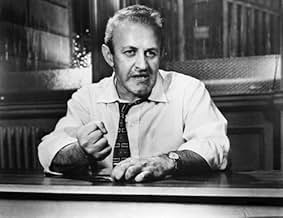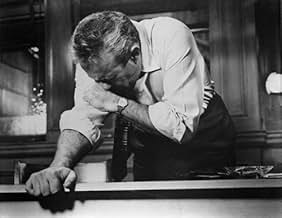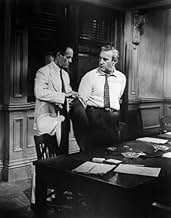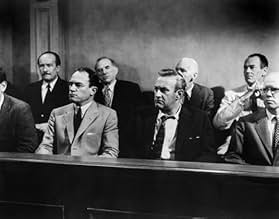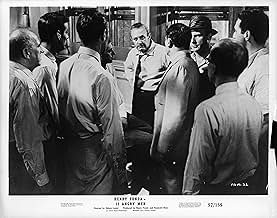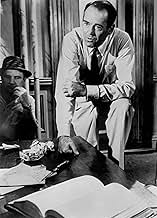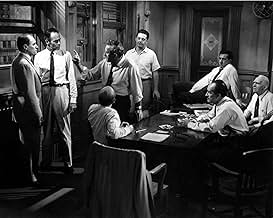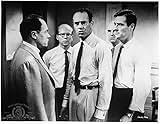Un membro della giuria tenta di impedire un errore giudiziario costringendo i suoi colleghi a riesaminare le prove.Un membro della giuria tenta di impedire un errore giudiziario costringendo i suoi colleghi a riesaminare le prove.Un membro della giuria tenta di impedire un errore giudiziario costringendo i suoi colleghi a riesaminare le prove.
- Candidato a 3 Oscar
- 16 vittorie e 12 candidature totali
Tom Gorman
- Stenographer
- (non citato nei titoli originali)
James Kelly
- Guard
- (non citato nei titoli originali)
Billy Nelson
- Court Clerk
- (non citato nei titoli originali)
John Savoca
- The Accused
- (non citato nei titoli originali)
Walter Stocker
- Man Waiting for Elevator
- (non citato nei titoli originali)
Riepilogo
Reviewers say '12 Angry Men' is acclaimed for its deep exploration of justice, prejudice, and reasonable doubt. The film is lauded for its strong ensemble cast, especially Henry Fonda's performance, and Sidney Lumet's impactful direction. Central themes include human nature, the justice system, and dialogue's power. Critics praise its engaging character interactions and moral dilemmas. Despite minor criticisms about character development and pacing, it is widely regarded as a timeless, relevant classic.
Recensioni in evidenza
This film is investing from start to finish. None of the performances feel like actors playing characters, but instead as people who just happen to be being filmed. The dialogue is phenomenal, the camerawork is absolutely phenomenal, the heat and claustrophobia of the environment sets in right away and gradually gets more and more intense. This film is absolutely phenomenal, and I would recommend it to absolutely anybody who enjoys film as an art form.
Oh Boy Oh Boy, it Took me Seven years to Rewatch This Masterpiece, Damn why don't they make em like this Anymore.
A young ethnic kid from a rough area is up on a murder charge and to the jury of twelve men, it all seems a fairly open and shut case. So all are surprised when the votes come back with one "not guilty" in the pack. Juror #8 maintains he holds a reasonable doubt, much to the frustration of the rest of the group. The stalemate forces a debate over the details of the case which sees each man questioning others and themselves for their motivations and decisions. The heat in the room and the passage of time sees tensions rising by the minute.
I'm not a massive fan of the "Movie You Must See" podcast crew because they mostly tend to discuss the events in a film rather than really critiquing or reviewing it (although at times this "mates in a pub" approach is OK). Anyway, one of the advantages of having anyone pointing out "films you should see" is that it reminds you that you should these films. So it was for me as I listened to 12 Angry Men and realised that not only had I never reviewed it but that I had not actually watched it for many years. Of course mentally I knew it was a "classic" but did I really understand why it was? So when it came on television recently I watched it again with new eyes.
The films moves right into the jury room and pretty much this room is all we have for the duration. Initially the script does really well to have the viewer side with the majority because in the discussions the evidence does seem very clear cut and #8's doubts seem so general and non-specific. This is a good way to start because it means the viewer also has to question and we are taken along the journey just like the men in the jury. Gradually we get into the detail and doubts are tweaked out not to the point of solving the crime because that is not what it is about but it is done in a way that is interesting and engaging. It is not perfect in this regards though because some of the jumps are big, some of the assumptions are stretching and some of the knowledge in the room is a little too convenient. However what weaknesses there are in the material are covered by the fact that the delivery is roundly quite brilliant.
Lumet directions from within the room and makes great use of such a small space. It feels like it could be a play (not sure if it was or not) but Lumet prevents this just feeling like filmed theatre. The camera captures the room, sticks close to characters, moves around, in and out accordingly and it never feels stiff. This aids the sense of tension from the audience point of view as we are not just left watching the room so much as being in it. The ensemble cast are another big factor in this delivery as they all deliver. On the surface of it the characters could easily be labelled "racist", "old", "naïve", "angry" and so on but the actors don't let themselves be that basic and they also do a good job of pacing the building resentment and tension in the room to be convincing. Fonda maybe has "top-billing" but he does have the least showy role, leading those into his corner. Cobb and Begley have good turns as the anger of the room but everyone plays their parts very well. OK Balsam, Webber and Voskovec come out the least memorable of the lot but this is understandable when viewed beside such sterling turns from Fielder, Klugman, Warden, Sweeney and Marshall. There really isn't a weak link in the room.
With modern cynical eyes it is perhaps totally hard to accept the film for its praise of the jury system and I do agree with the "MYMS" group when they made reference to the moment in H:LOTS which is essentially the bitter reverse of this film. However this slightly flag-waving stuff is covered by the delivery being as strong and as well paced as it is. Overall then this is an eminently watchable film and I can understand why it is so well regarded. The material and message may not be note-perfect but the delivery is brilliant across the board and it is one that I could easily return to again and again and still get pleasure out of how well it is all done.
I'm not a massive fan of the "Movie You Must See" podcast crew because they mostly tend to discuss the events in a film rather than really critiquing or reviewing it (although at times this "mates in a pub" approach is OK). Anyway, one of the advantages of having anyone pointing out "films you should see" is that it reminds you that you should these films. So it was for me as I listened to 12 Angry Men and realised that not only had I never reviewed it but that I had not actually watched it for many years. Of course mentally I knew it was a "classic" but did I really understand why it was? So when it came on television recently I watched it again with new eyes.
The films moves right into the jury room and pretty much this room is all we have for the duration. Initially the script does really well to have the viewer side with the majority because in the discussions the evidence does seem very clear cut and #8's doubts seem so general and non-specific. This is a good way to start because it means the viewer also has to question and we are taken along the journey just like the men in the jury. Gradually we get into the detail and doubts are tweaked out not to the point of solving the crime because that is not what it is about but it is done in a way that is interesting and engaging. It is not perfect in this regards though because some of the jumps are big, some of the assumptions are stretching and some of the knowledge in the room is a little too convenient. However what weaknesses there are in the material are covered by the fact that the delivery is roundly quite brilliant.
Lumet directions from within the room and makes great use of such a small space. It feels like it could be a play (not sure if it was or not) but Lumet prevents this just feeling like filmed theatre. The camera captures the room, sticks close to characters, moves around, in and out accordingly and it never feels stiff. This aids the sense of tension from the audience point of view as we are not just left watching the room so much as being in it. The ensemble cast are another big factor in this delivery as they all deliver. On the surface of it the characters could easily be labelled "racist", "old", "naïve", "angry" and so on but the actors don't let themselves be that basic and they also do a good job of pacing the building resentment and tension in the room to be convincing. Fonda maybe has "top-billing" but he does have the least showy role, leading those into his corner. Cobb and Begley have good turns as the anger of the room but everyone plays their parts very well. OK Balsam, Webber and Voskovec come out the least memorable of the lot but this is understandable when viewed beside such sterling turns from Fielder, Klugman, Warden, Sweeney and Marshall. There really isn't a weak link in the room.
With modern cynical eyes it is perhaps totally hard to accept the film for its praise of the jury system and I do agree with the "MYMS" group when they made reference to the moment in H:LOTS which is essentially the bitter reverse of this film. However this slightly flag-waving stuff is covered by the delivery being as strong and as well paced as it is. Overall then this is an eminently watchable film and I can understand why it is so well regarded. The material and message may not be note-perfect but the delivery is brilliant across the board and it is one that I could easily return to again and again and still get pleasure out of how well it is all done.
This film deserves to be on anyone's list of top films. My problem is that it is so perfect, so seamlessly polished, it is hard to appreciate the individual excellences.
The acting is top notch. I believe that monologue acting is quite a bit simpler than real reactive ensemble acting. Most of what we see today is monologues pretending to be conversations. But in this film, we have utter mastery of throwing emotions. Once the air becomes filled with human essence, it is hard to not get soaked ourselves as the camera moves through the thick atmosphere. Yes, there are slight differences in how each actor projects (Fonda internally, Balsam completely on his skin...) but the ensemble presents one vision to the audience.
The writing is snappy too. You can tell it was worked and worked and worried, going through several generations. It is easy to be mesmerized by this writing and acting, and miss the rare accomplishment of the camera-work. This camera is so fluid, you forget you are in one room. It moves from being a human observer, to being omniscient, to being a target. It is smart enough to seldom center on the element of most importance, so expands the field to all men.
This is very hard. Very hard, to make the camera human. So much easier to do what we see today -- acknowledge the machinery and jigger with it. Do we have a filmmaker today who could do this?
Ted's Evaluation -- 4 of 3: Every cineliterate person should experience this.
The acting is top notch. I believe that monologue acting is quite a bit simpler than real reactive ensemble acting. Most of what we see today is monologues pretending to be conversations. But in this film, we have utter mastery of throwing emotions. Once the air becomes filled with human essence, it is hard to not get soaked ourselves as the camera moves through the thick atmosphere. Yes, there are slight differences in how each actor projects (Fonda internally, Balsam completely on his skin...) but the ensemble presents one vision to the audience.
The writing is snappy too. You can tell it was worked and worked and worried, going through several generations. It is easy to be mesmerized by this writing and acting, and miss the rare accomplishment of the camera-work. This camera is so fluid, you forget you are in one room. It moves from being a human observer, to being omniscient, to being a target. It is smart enough to seldom center on the element of most importance, so expands the field to all men.
This is very hard. Very hard, to make the camera human. So much easier to do what we see today -- acknowledge the machinery and jigger with it. Do we have a filmmaker today who could do this?
Ted's Evaluation -- 4 of 3: Every cineliterate person should experience this.
There are a few wonderful courtroom dramas out there, Anatomy of a Murder, To Kill a Mockingbird and Witness for the Prosecution immediately springing to mind. 12 Angry Men is so brilliant, it could very well be the definitive courtroom drama on film. Sidney Lumet's direction is masterly, and although the action takes place on one set(an actual New York drawing room) there are a huge variety of innovative camera angles and visual set-ups. The screenplay is sophisticated and smart, and the story is compelling and intelligent. The film is also brilliantly made, and the acting is superb. Henry Fonda especially dominates the film, with an integrity that makes his character so wonderful, but the other actors are wonderful as well, Ed Begley, Jack Warden, John Fiedler, Lee J Cobb, Rudy Bond et al. are all impeccable support to Fonda. Overall, brilliant courtroom drama. 10/10 Bethany Cox
Lo sapevi?
- QuizDirector Sidney Lumet had the actors all stay in the same room for several hours on end and do their lines over and over without filming them. This was to give them a real taste of what it would be like to be cooped up in a room with the same people.
- BlooperWithin the last half hour of the movie, the clock on the wall in the jury room can be seen indicating 6:15. Several minutes later, E.G. Marshall states that it is "a quarter after six". Several minutes after that, the wall clock is seen again, but still shows 6:15. Still later, when Lee J. Cobb leans over the table after he tears up the snapshot from his wallet, his watch can be seen indicating 5:10.
- Citazioni
Juror #8: Let me ask you this: Do you really think the boy'd shout out a thing like that so the whole neighborhood could hear him? I don't think so - he's much too bright for that.
Juror #10: Bright? He's a common ignorant slob. He don't even speak good English.
Juror #11: [who has a foreign accent] He *doesn't* speak good English.
- Curiosità sui creditiAt the end of the film, the actors are billed in order of their juror numbers; thus Henry Fonda, although the star of the film, appears 8th.
- Versioni alternativeThe United Artists logo is plastered with black and white versions of the MGM/UA Communications Co./1987 United Artists logo in the 1990 VHS, and 1994 variant in the DVD. But in the 2008 DVD and some TV prints, it featured the colorized opening and closing MGM logos.
- ConnessioniEdited into Voskovec & Werich - paralelní osudy (2012)
I più visti
Accedi per valutare e creare un elenco di titoli salvati per ottenere consigli personalizzati
- How long is 12 Angry Men?Powered by Alexa
- Where was the movie shot?
- Are any of the actors from the jury still alive?
Dettagli
- Data di uscita
- Paese di origine
- Lingua
- Celebre anche come
- 12 hombres en pugna
- Luoghi delle riprese
- Azienda produttrice
- Vedi altri crediti dell’azienda su IMDbPro
Botteghino
- Budget
- 350.000 USD (previsto)
- Lordo in tutto il mondo
- 2945 USD
- Tempo di esecuzione1 ora 36 minuti
- Colore
- Mix di suoni
- Proporzioni
- 1.85 : 1
Contribuisci a questa pagina
Suggerisci una modifica o aggiungi i contenuti mancanti

Divario superiore
What was the official certification given to La parola ai giurati (1957) in Canada?
Rispondi


